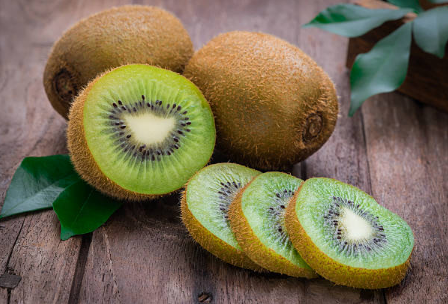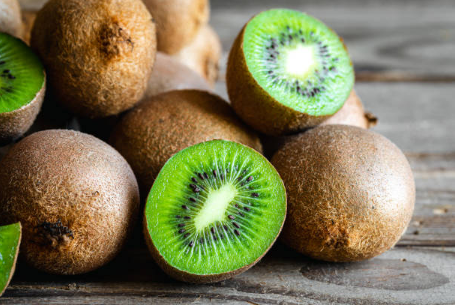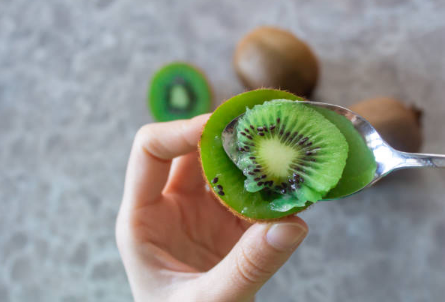Kiwifruit, once known as the “Chinese gooseberry”, is a small fruit with remarkable nutritional value. Kiwifruit is native to the hillsides of southwestern China and is now a popular fruit grown in many parts of the world. It got its name from New Zealand fruit exporters, who named it after the flightless kiwi based on the similarity of appearance.
There are several types of kiwifruit, but the two most commonly consumed kiwifruit have the scientific names of Actinidia deliciosa and Actinidia chinensis. Actinidia deliciosa is a typical green kiwi commonly found in stores. However, regardless of the type, kiwi has many evidence-based health benefits. They are rich in vitamin C, which can support digestive, heart, and eye health, among other health benefits.

Supports Digestive Health
Kiwifruit contains both soluble and insoluble fiber, which starts in the digestive system and supports health on multiple levels. Soluble fiber supports a healthy gut microbiome, while insoluble fiber helps maintain regular bowel movements. Studies have shown that the fiber in kiwifruit affects the consistency and passage time of stool more than the fiber in other fruits through its water-holding capacity.
These digestive benefits can help those suffering from constipation relieve symptoms by increasing stool bulk and reducing the amount of time it stays in the digestive tract. In addition, a healthy gut microbiome can support many health goals. Research continues to point out its profound impact on health issues such as diabetes, irritable bowel syndrome (IBS), cardiovascular disease, and depression.
An Excellent Source of Vitamin C
Kiwifruit is an excellent source of vitamin C, a powerful antioxidant necessary for a healthy immune system. Vitamin C helps protect the body from oxidative damage caused by free radicals, which are molecules or molecular fragments with at least one set of unpaired electrons. Oxidative stress triggered by free radicals damages healthy cells and is thought to play a role in a variety of diseases. Just one kiwi provides 64 milligrams (mg) of vitamin C, which is equivalent to 71% of the recommended intake for men and 85% of the recommended intake for women.
Studies have shown that eating two kiwis a day for as little as four weeks can improve immune cell function in people with low serum vitamin C levels. These immune cells, called neutrophils, are white blood cells that help protect the body from infection.
May Be Good for Heart Health
A diet rich in fruits and vegetables can help support heart health through a variety of mechanisms, and kiwi can be a contributor. For example, a study examining kiwifruit intake and blood pressure found that participants who ate three kiwis per day had lower blood pressure than those who ate other fruits. In addition to regular exercise, adding kiwifruit to a balanced diet can help maintain healthy blood pressure levels.
Kiwifruit may also have a positive effect on cholesterol. Studies have shown a link between daily kiwifruit consumption and lower total cholesterol and triglycerides. The study even linked kiwifruit to improved HDL cholesterol (healthy cholesterol).

Supports Weight Management
Kiwi can be a nutritional addition to a balanced diet, especially for those who want to lose weight. They are delicious but low in calories, which means they satisfy an appetite without adding too much energy intake.
Kiwifruit also contains dietary fiber, which can increase the amount of food you eat but does not affect your calorie intake. In addition, fiber helps create a feeling of fullness, which helps prevent overeating. For reference, 1 kiwi provides about 42 calories and 2 grams of fiber.
Still, it’s important to remember that sustainable weight management relies on a balanced diet of fruits, vegetables, lean proteins, whole grains, and healthy fats. Individualized nutritional needs should be carefully considered when consuming kiwifruit.
May Improve Eye Health
Interestingly, kiwifruit may also benefit eye health. Their impressive nutrient profile can help maintain optimal vision and reduce the risk of age-related eye problems, such as macular degeneration and cataracts. The lutein and zeaxanthin carotenoids in kiwifruit can help reduce oxidation in the eye, which can eventually lead to cataracts. Compared to other sources of carotenoids, kiwifruit has a higher bioavailability.
The vitamin C in kiwifruit also plays an important role in eye health and eye structure. As an antioxidant, it may help reduce inflammation and the resulting risk of common eye problems such as macular degeneration. However, further research is needed to better understand the relationship between vitamin C and eye health.
While a deeper understanding of kiwi and its role in the eye is needed, regular consumption of kiwifruit may benefit those who want to actively protect their eye health.
Hypoglycemic Index
Carbs are essential for a healthy diet, but not all carbohydrates are created equal. Some provide more nutritional value, while others cause a significant increase in blood sugar. The glycemic index ranks carbohydrate-containing foods based on their effect on blood sugar levels. Foods are ranked on a scale from 0 to 100 based on how quickly they raise blood sugar. The faster they are effective, the higher their rating.
Kiwifruit has a high water content and is considered a low glycemic index food. The green kiwifruit variety has a glycemic index of about 39, and the golden variety has a glycemic index of about 48. Since kiwifruit has a limited effect on blood sugar levels compared to other fruits, it can be a good choice for people with diabetes.

Nutrition of Kiwifruit
One kiwi fruit with a diameter of 2 inches, or about 69 grams of raw green kiwi pulp, provides:
- Calories: 42.1
- Fat: 0.36 grams
- Sodium: 2.07毫克(mg)
- Carbs: 10.1 grams
- Fiber: 2.07 grams
- Added sugars: 0 grams
- Protein: 0.79 grams
- Vitamin C: 64 mg
- Vitamin K: 27.8 micrograms (mcg)
- Copper: 0.09 mg
Kiwifruit is an energetic fruit that is rich in many essential vitamins and minerals. One kiwi provides 10 grams of carbohydrates, providing energy without causing a sharp rise in blood sugar levels.
Kiwifruit is also rich in vitamin C, a nutrient that is effective for the immune system, and vitamin K, which is essential for blood clotting and bone health. Finally, kiwifruit contains about 10% of the recommended daily intake of copper. The body uses copper to perform many important functions, including making energy, blood vessels, and connective tissue.
The Risk of Kiwi
Kiwifruit is generally considered safe for the average healthy person. However, they pose a significant risk to people with kiwi allergies. Kiwifruit contains many allergens, including kiwi, the main allergen.
Signs of kiwi allergy include:
- Abdominal pain
- Vomit
- Wheezing
- Difficulty swallowing
- Generalized urticaria
- Itchy throat and mouth
- Facial puffiness

Tips for Eating Kiwifruit
Kiwi is a nutritious fruit that has many health benefits in addition to its delicious taste. Consider the following tips for consuming kiwifruit:
- To quickly peel a kiwi, cut it in half and scoop out the pulp with a spoon.
- Eating the peel can add extra fiber.
- Once ripe, kiwifruit should be refrigerated until edible.
- The flesh of kiwi is green or golden.
- Mix the kiwi chunks with mango, peppers, and cilantro to make a delicious salsa.
- Layer kiwi slices with Greek yogurt and low-fat granola to make a nutritious breakfast parfait.
- Add kiwi slices to a variety of smoothie recipes to add vitamin C and copper to nutritious snacks.
Conclusion
Kiwi is a powerful fruit that is rich in flavor and nutrients. Despite its small size, it provides a large amount of the recommended daily intake of vitamins and minerals. Kiwifruit is rich in vitamin C, copper, and vitamin K, and contains small amounts of many other important nutrients. Their impressive nutrient profile supports many pathways to health, including digestion, weight management, and blood sugar control. They also support heart and eye health, as well as a healthy immune system.
Kiwifruit is generally considered safe, with the exception of people with a known allergy to the fruit or any of its components. A registered dietitian dietitian dietitian can help you incorporate kiwifruit and other nutritious fruits into a balanced diet to help achieve your health and wellness goals.